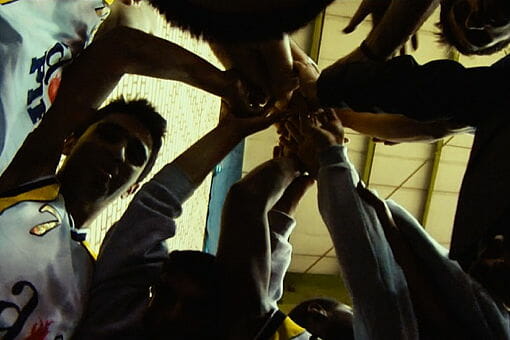By Ryan Mason · June 22, 2012

Not many Americans would imagine traveling to Iran much less moving there for a year to work, yet that’s exactly what journeyman basketball player Kevin Sheppard did in 2008. The Iran Job is the brave, often hilarious account of his trip captured by one-man film crew Till Schauder.
Structured as your standard sports film following Sheppard’s arrival to this brand-new Iranian team – the A.S. Shiraz – and the expectations that he’ll take them to the playoffs (a first for a team just entering the league), The Iran Job is also the combination of a hilarious fish-out-of-water story with fascinating socio-political commentary. And when I say hilarious, I mean it. Sheppard is extremely charming, personable, and completely at ease in front of the camera; we relate to him instantly, wanting to see him lead his team to victory at the same time we’re always slightly concerned for not just his safety, but that of the filmmaker and most notably the female friends that Sheppard makes during his stay. Yet he handles all this with grace and plenty of humor.
Sheppard is the star and makes the film, undoubtedly; however, his supporting cast of unique characters elevates the experience even further. You’ll never forget them: the “My Boy” pizza guy who speaks no English but absolutely loves Sheppard; the three women – Hilda, Elaheh, and Laleh – who befriend Sheppard and expose him to the realities of what it’s like being a female living under the oppressive Iranian government; Sheppard’s roommate and fellow basketball player, Zoran, a seven-foot Serbian who is the only other non-Iranian on the team; the storeowner who tells Sheppard how much he loves black people, especially Bob Marley; and many others who leave indelible marks on Sheppard and the audience.
Schauder, co-producer Sara Nodjoumi, and editor David Teague do a fantastic job of keeping the film moving along, the basketball season acting as the conventional plot engine pushing everything forward with the subplot of Sheppard living life in Shiraz – and mainly his friendship with the three women – filling out the sports drama with heart and plenty of moments that will likely challenge many Americans’ preconceived notions of what life is like in what’s considered one of the most dangerous countries on the planet. Ultimately, many of our concerns about the freedoms – or rather, the lack thereof – for Iranian women are confirmed; however, many may be surprised at still how normal their everyday is. There are pizza shops and restaurants and big buildings, modern luxuries and cell phones and marriages, divorces and heartbreaks and, of course, basketball. Only instead of being able to buy a beer to go with your pizza, you can only get soda or a non-alcoholic substitute. And instead of seeing billboards for the new iPad along the highway, you get constant advertisements for President Ahmadinejad and the Supreme Leader Khamenei.
Adding to all of this inherent intrigue is the fact that in the time span of the film – summer 2008 through summer 2009 – both America and Iran saw momentous socio-political changes: the former electing its first African-American president, and the beginning of the latter’s Green Revolution, which set off what would be known as the Arab Spring. The film is political insofar as it’s impossible for it not to be, what with the international relations between America and Iran so fraught with threats and inflammatory rhetoric.
But, what truly makes The Iran Job special is that the film focuses on elements that bring us all together rather than those that push us so far apart. Schauder depicts an Iran full of people with much more in common with Americans than not: people who aren’t happy with everything about their government; people who are religious but are not zealots; people who find other cultures interesting, not repulsive; people who see others as people to befriend rather than enemies to be eradicated. And for that, The Iran Job is surprisingly uplifting and positive despite the brutal realities that surround the world today. What a welcomed change from our negativity-soaked media monolith.